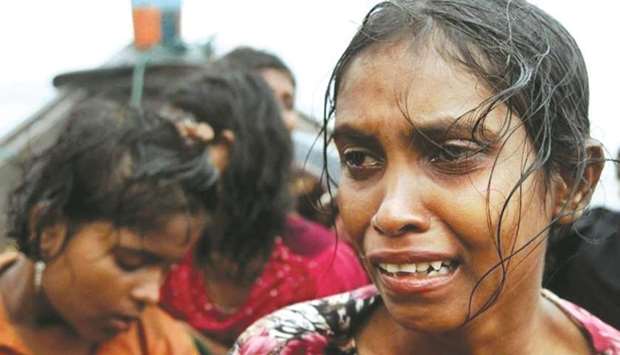While the world is busy with great events, there are other events where many vulnerable people are lost, especially minorities. The Rohingyas are considered the most persecuted in the world today by continuous violations.
The growing fears that the Rohingya issue may become a permanent item on the United Nations agenda and a forgotten file amidst many of the files periodically discussed by the UN Security Council have given a negative impression to pass a resolution on this case and replace that with a presidential statement.
While the Security Council issued its statement on the suffering of thousands of Rohingya Muslims, human waves continued to migrate from Myanmar to Bangladesh amid an international inability to stop their persecution or to protect them.
The council unanimously last week demanded that the authorities ensure that military does not use excessive force against the Rohingya, and hold those responsible for human rights violations accountable and take urgent action for the return of refugees to their areas.
Since August 25, the Myanmar army has committed “brutal massacres” against the Rohingya Muslim minority in the western province of Rakhine, Arakan, killing thousands of people, while some 820,000 people have been deported to Bangladesh. The Security Council expressed its concern over reports of human rights violations in Rakhine State by the Myanmar security forces, especially against Rohingya.
“The statement calls on Myanmar to stop the military force against the Rohingya, stressing the need for immediate humanitarian access, and the need to hold accountable those involved in human rights violations,” US ambassador to the UN Jonathan Allen told reporters at the UN headquarters in New York. The statement also “calls upon the Myanmar authorities to co-operate with the UN and to take urgent measures for the return of Rohingya refugees to their homes .”
The government of Myanmar considers the Rohingya Muslims to be “illegal immigrants” from Bangladesh.
Last week, Burmese leader Aung San Suu Kyi made her first visit to the west of the country, where the UN accuses the army of “ethnic cleansing” targeting the Rohingya.
Suu Kyi, the Nobel Peace Prize laureate who came to power in Burma in April 2016, made no statement.
Suu Kyi has been strongly criticised for her mistreatment of the Rohingya, and has to consult an army that is still very strong even though the ruling military group resolved itself in 2011, and with a largely hostile view of Muslims and foreigners.
She also visited destroyed villages in Mongdao and Putidong regions and met with a large number of groups living there. Burmese authorities have so far denied accusations of “ethnic cleansing” and stressed that they wants to root out the insurgency led by the Rohingya Arakan Salvation Army.
Economic development is the long-term effective treatment of this region, which is one of the poorest areas in the country, with 78% of the population. But humanitarian organisations mention that it faces an urgent humanitarian situation. Humanitarian aid reaches Rakhine in small quantities, and allows only the Red Cross to operate in the area.
“We encourage the authorities to facilitate the work of humanitarian activists, because the Red Cross alone cannot meet the needs, and a large number of people who have left their homes are living in miserable conditions,” both in neighboring Bangladesh or in the state of Rakhine,” said Dominique Stellehart, the head of the NGO in Burma.
This minority is characterised by their use of the Rohingya language and their conversion to Islam, where they represents a Muslim minority in a Buddhist country.
Myanmar has been persecuting them for a long time and denying their fundamental right to worship. They are the people who have been denied citizenship in the world, they have no identification papers, cannot travel or get married without permission, and are unable to access the labour market or public services such as schools and hospitals.
This issue dates back to the period of British colonisation, where the latter incited the Buddhist majority to commit massacres against the Rohingya, which claimed the lives of thousands of people in 1942. After the departure of the British colonialists in 1948 and the establishment of the state. In 1974, the Rohingyas were stripped of their Myanmar nationality and considered foreigners.
The Rohingya refugee crisis and the threat of sanctions may hurt Myanmar’s efforts to attract Western investment, pushing the country further into China’s economic space and making US and European companies fear their reputation if they invest in Myanmar. Before and after the outbreak of the crisis in August, Western investments have fallen from their counterparts from Asian Myanmar partners and their fears will be further exacerbated by reports that the United States and the European Union are considering sanctions against members involved in acts of violence against the Rohingya Muslims, described by the UN as ethnic cleansing work.
Human Rights Watch said that Myanmar security forces were ignoring international condemnation and that the time had come to impose tougher sanctions that could not be ignored. It called on governments to impose a travel ban and freeze the assets of the officials involved in serious abuses, expand the prohibition of the arms embargo, as well as a ban on financial transactions with major military-owned companies.

Since August 25, the Myanmar army has committed u201cbrutal massacresu201d against the Rohingya Muslim minority in the western province of Rakhine.
